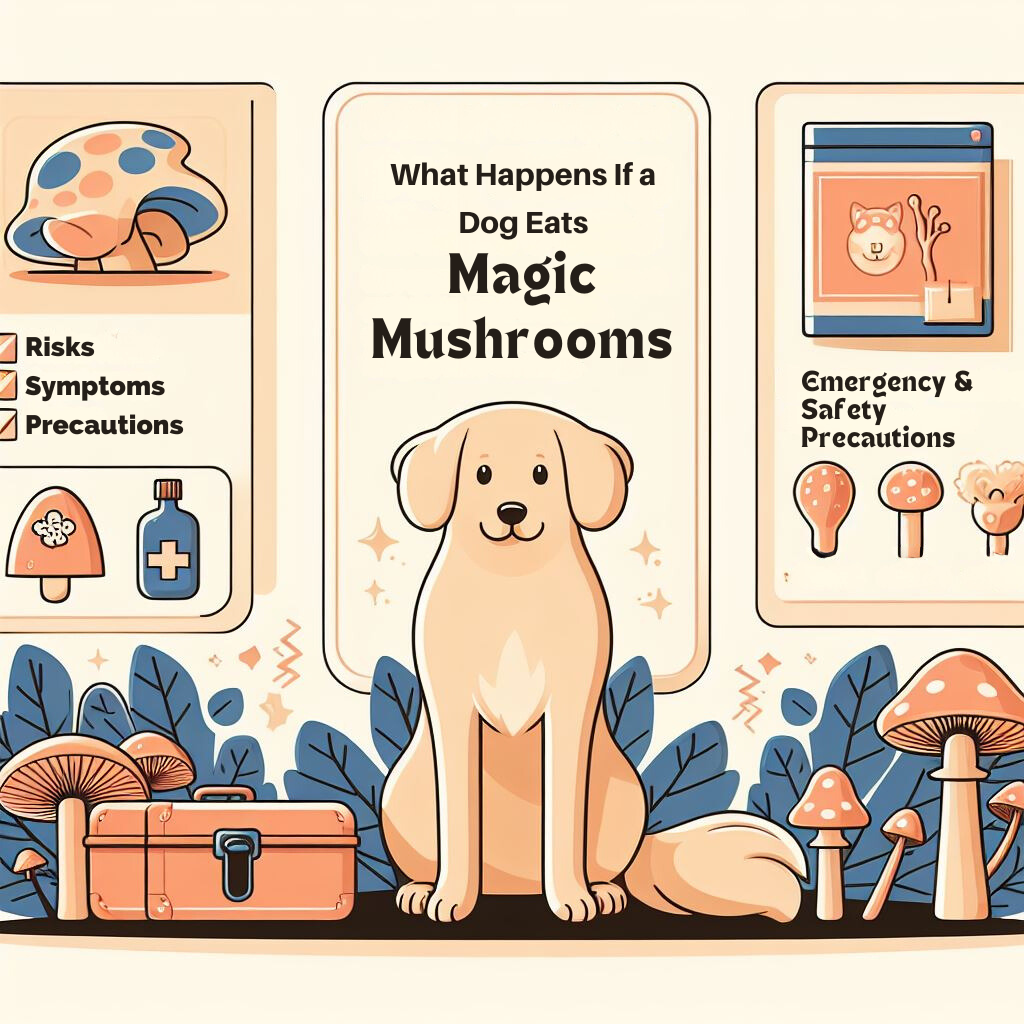No products in the cart.
What Happens If a Dog Eats Magic Mushrooms?
Posted Date:05 Jan 2024 |
As caring pet owners, we must protect our furry friends from potential hazards in and around the home. Unfortunately, curious pets can sometimes access and consume Magic mushrooms even when precautions are taken.
If you suspect your pet has ingested something toxic, it is essential to remain calm and take prompt action. Look around for clues about what may have been consumed, such as missing medications, chewed-up plants, or spilled cleaning agents. Check the area the pet was in as well as the garbage.
What Happens When Dogs Eat Magic Mushrooms?
Magic mushrooms contain psychoactive compounds like psilocybin and psilocin, which can have profound effects on humans. Similarly, when dogs ingest these mushrooms, they can experience adverse reactions. Dogs are susceptible to these compounds, and even a small amount can cause various symptoms.
If you discover or highly suspect your pet has swallowed something poisonous or unhealthy, call your veterinarian or animal poison control right away. Depending on the substance and amount ingested, they may advise you to induce vomiting, administer diluting or absorbing agents, or bring your pet in for emergency decontamination and medical treatment.
Having the phone numbers for your vet and poison control readily available can save critical time in these scenarios. Information on the product label can also assist medical staff in determining toxicity levels and proper response.
Prevention is key when it comes to pet safety. Keeping hazardous substances properly stored and disposed of reduces risks. Securing trash cans and using baby gates to restrict access to certain areas of the home helps keep curious pets out of trouble. With vigilance and preparedness, pet owners can help protect the health of their beloved companions.
Recognizing Signs of Illness in Your Pet
As caring pet owners, we must learn to recognize changes in our companions that could signal illness or injury requiring medical attention. While every pet is unique, there are some common physical and behavioral signs to look out for.
Behavior Changes
Subtle shifts in your pet’s typical temperament or actions can provide early indication that something may not be right. Unusual agitation, restlessness, lack of interest in normal activities, or sudden aggression/fear may suggest your pet is not feeling well. Personality changes when interacting with family members or other household pets could also raise concern.
Loss of Coordination
Difficulty walking, standing, or maintaining balance may point to a more serious underlying condition. Trouble climbing stairs or jumping up on furniture, stumbling, swaying, or tremors can indicate distress or impairment. Likewise, a head tilt or circling could signify injury, infection, or neurological issue.
Gastrointestinal Upset
Vomiting and diarrhea are common symptoms of dietary indiscretion or illness. Bloody stool, vomiting more than 2-3 times, or inability to hold down food/water warrants prompt vet examination to check for obstruction, toxins, parasites or other issues.
Irregular Heart Rate
While challenging for owners to detect, accelerated or irregular heartbeat in pets should not be ignored. If you notice panting, restlessness, weakness or collapse, seek immediate veterinary assessment for potential heart disease or toxicity.
Excessive Drooling
Drooling on its own may simply indicate excitement or nausea. However, if combined with lethargy, swallowing difficulties, or facial swelling, it can signal a dental abscess, oral injury, or other concerning condition requiring veterinary attention.
Dilated or Constricted Pupils
Substantial dilation or constriction of your pet’s pupils alongside behavioral changes may suggest trauma, toxicity, neurological issues or worrisome disease. Unequal pupil sizes are also problematic. Checking eye appearance is part of monitoring complete health.
Seizures
Witnessing your pet experiencing sudden uncontrolled muscle spasms and losing consciousness is very distressing. Seek emergency vet care immediately if seizures last more than a couple minutes or happen back-to-back. Timely treatment is critical.
While every pet owner hopes they’ll never face a serious health scare with their companion, recognizing warning signs early is key. Consult your veterinarian promptly if anything seems amiss. Trust your instincts – you know your pets best. With close observation and vigilance, you can help safeguard their wellbeing.
How To Tell If Your Dog Ate Magic Mushrooms:
As a pet owner, you may encounter the occasional mystery of your companion getting into something they shouldn’t while unsupervised. Whether it’s the garbage can they tipped over or the houseplant they chewed up, do some detective work to figure out the cause of any unusual symptoms you observe.
Look For Clues
Survey the area where your pet was before any concerning signs appeared. Are there tipped-over waste bins, missing food items, opened packages, or spat-out contents that provide hints? Be meticulous and open-minded in your sleuthing.
Notice Temporal Links
Think back to when the symptoms first arose and retrace your pet’s activities and location in the preceding hours. Were they briefly left alone? Did they have access to rooms or items they don’t usually have? Any potential correlations to their current state?
Observe Physical Evidence
Examine your pet’s mouth, paws, and coat for telltale signs. Are there incriminating crumbs, stains, or chewed up foliage detected? Paw prints or trail marks might help reconstruct their path. Vomit or stools may contain clues to ingestion.
Know Your Pet’s Typical Behavior
Reflect on whether the symptoms are aligned with your pet’s normal disposition. Sudden unexplained gastrointestinal, neurological or behavioral changes in a typically healthy pet warrant investigation.
Document All Details
Jot down everything you can recall, take photos of any evidence, and monitor your pet closely. Vet consult is advised for concerning or escalating symptoms. Having a detailed account of your observations helps the veterinary team make an accurate diagnosis.
Consider All Possibilities
While garbage raiding or eating forbidden human foods is common, also think through other options like exposure to toxins, plants, or small items that could be swallowed. Every detail matters when determining the cause.
Act Quickly But Calmly
If you have reason to believe your pet ingested something seriously harmful, call your vet or animal poison control right away to receive prompt life-saving guidance. Stay calm; panic will not help.
Prevention is Ideal
Going forward, take proactive steps to pet-proof your home, especially kitchen and garbage. Secure waste bins, use baby gates, keep human food out of reach, and monitor pets when loose to limit access to potential hazards.
With conscientious observation, forethought, and the right preventative measures, pet owners can help protect their furry friends from getting into perilous situations when unwatched. Pay attention to clues and always call the vet with any concerns. Your pet’s wellbeing is the top priority.
What To Do If Your Dog Eats Magic Mushrooms:
Discovering your pet ingested something potentially toxic requires prompt yet thoughtful action. Don’t panic, but don’t delay getting them medical attention. Time is of the essence.
Gather Information
Look for any packages, labels, chewed-up matter, or other clues indicating what was consumed and the approximate quantity. Details help veterinary staff determine toxicity levels and proper treatment.
Contact Animal Poison Control
Call either your regular vet or the ASPCA/Pet Poison Helpline, which is available 24/7. Consult the experts before taking any action like inducing vomiting, which can be harmful in some cases. Follow their guidance.
Provide a Calm Setting
Remove your pet gently to a quiet, peaceful room away from the commotion and other pets. Dim lighting, soothing sounds, and minimal stimulation help reduce stress for a pet feeling ill. Observe them closely.
Transport to Vet if Advised
Based on circumstances, vets may request you bring your pet in immediately for examination and decontamination treatment. Carry a sample of the ingested substance if possible. Keep your companion calm and comfortable during transport.
Follow All Medical Instructions
Vets may induce vomiting, administer charcoal to absorb toxins, provide IV fluids or antidotes, or take other steps based on the substance ingested and the timing of intake. Stick to all prescribed medication and follow-up.
Offer Lots of TLC
Once home, allow your pet to rest and recover in a calm environment. Offer favorite toys, soft bedding and gentle reassurance. Schedule follow-ups as needed. Shower with affection!
Secure Toxins in Your Home
Going forward, inspect your home for unsecured medications, plants, chemicals or foods that could harm pets if ingested. Lock away hazards or use baby gates to restrict access.
Learn Pet First Aid
Take a class to prepare for future emergencies. Having first aid knowledge and vet contacts readily available helps you respond quickly in the rare event your pet gets into something dangerous.
Stay Vigilant on Walks
When outdoors, keep your pet on a leash and prevent eating unknown plants, fungi or creatures. Carry water to rinse out their mouth if needed. Better to be cautious.
By keeping your composure, contacting animal poison experts promptly, and diligently following medical guidance, you give your pet the best chance of full recovery. With proper preparation and vigilance, you can safeguard their health and well-being in the long term.
Conclusion
The ingestion of magic mushrooms by dogs can pose serious health risks and require immediate attention. Recognizing the signs of mushroom ingestion and taking prompt action by contacting a veterinarian are crucial steps in ensuring your dog’s well-being. As responsible pet owners, we must keep potentially harmful substances out of reach and be vigilant in protecting our furry friends from accidental ingestion of items like magic mushrooms. Always prioritize your dog’s safety and seek professional veterinary assistance if you suspect mushroom ingestion or any other form of poisoning. Explore a safer haven for fungi enthusiasts at Mushroom Village, where you can find a diverse selection of mushrooms for various purposes, minus the risks associated with those not intended for canine companions.
Comments: 0

